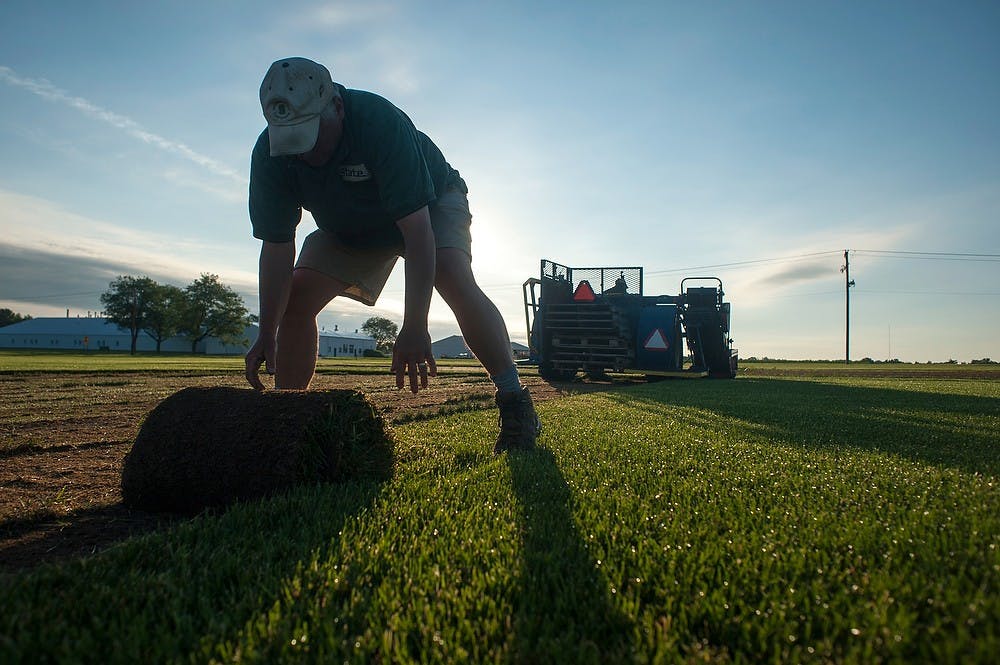U.S. Farm Report featured Michigan State University for the first time on its Oct. 30 episode.
U.S. Farm Report is the nation’s leading agricultural television show. It highlights agricultural news and business, as well as rural issues and lifestyle. The program typically garners over a half a million viewers each weekend, according to RFDTV.
The MSU episode featured and highlighted a discussion panel with MSU professors, professor Jason Rowntree's research, the Beal Seed Experiment and turf management at MSU.
“We are Michigan's land grant college. I've heard people call it Michigan’s State University,” assistant professor Trey Malone said. “This was an opportunity for us to really emphasize all of the things that are going on that line up with that land grant mission.”
The episode was a part of U.S. Farm Report’s College Roadshow, a series highlighting current agricultural research and news at top agricultural schools across the country.
Agricultural economists discuss supply chain disruptions
The televised discussion panel consisted of associate professor David Ortega, assistant professor Trey Malone, Professor Emeritus James Hilker and U.S. Farm Report host Tyne Morgan. It occurred on Thursday, Oct. 28 outside of the Agricultural Hall. Students were invited to come and watch.
“I was just excited for us to have the opportunity to showcase what we're doing at Michigan State,” Malone said.
The panelists provided insight into the issues affecting the agricultural and food sectors. They discussed commodity prices and supply chain disruptions, focusing on the effects of COVID on the economy and supply chains.
“We're seeing major supply chain disruptions, not only on manufactured products that we buy every day, but also, it's affecting our food and agricultural sectors,” associate professor David Ortega said. “We're seeing reports, again, of stock outs at grocery stores, people not able to get, and in particular farmers, not able to get input or parts for their tractors on time, and that's all sort of connected to the larger supply chain issues.”
Professor Jason Rowntree researches sustainable agricultural practices
The episode also highlighted professor Jason Rowntree’s research on understanding how agricultural management impacts greenhouse gas emissions, with the segment mainly focusing on his work of offsetting the grazing footprint.
“It's always a nice experience to work with a national show,” said Rowntree. “The farm report is obviously one that's very centric to the agriculture community, and so it's great for that and most importantly, to represent MSU and all the good work that the university is doing to help the agriculture industry.”
A look into the Beal Seed Experiment
Recently retired MSU professor Dr. Frank Tewelski delved into the seed experiment that MSU has been studying since 1879 — professor Beal, interested in discovering how long seeds remain viable, buried seeds from 21 different species of weeds in bottles 142 years ago. Today, these bottles are dug up every 20 years to record what seeds germinate. Only one species has survived.
Episode features MSU's top turf management program
Finally, the episode ended with a look into turf management at MSU.
“I thought it was great, being that we have a history of being an agricultural institution,” Andy Flynn said. “I thought it was terrific for them to stop at Michigan State University. I'm a graduate of the Crop and Soil Science Turfgrass Management program, so I thought it was a really neat thing to be featured on that because even though it's just turf grass, it's still agriculture.”
MSU's deep agricultural history
Michigan State University has deep roots in agriculture — the school was originally founded as the Agricultural College of the State of Michigan. It was the first agricultural school to be established in the United States. Today, MSU is a leading agricultural school, with the Agricultural Sciences program ranking in the top 25 educational programs in the world, according to MSU Today.
Support student media!
Please consider donating to The State News and help fund the future of journalism.
“It's kind of cool to see that more than 100 years after the founding of the university, we're still doing all of this really important agricultural research and engaging students on those topics,” Malone said.
The panel aired Saturday, Oct. 30.
Discussion
Share and discuss “US Farm Report features Michigan State for first time ” on social media.







